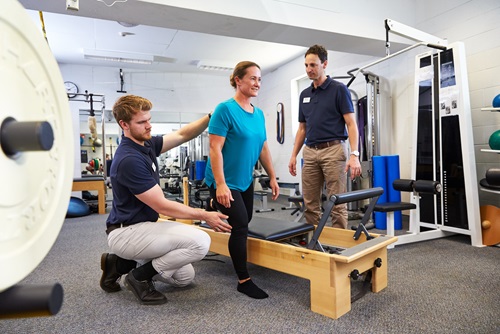In the midst of COVID-19, an ageing population, increasing disease rates and introduction of the National Disability Insurance Scheme, there’s never been a better time to start a career in health. This vital industry is not only Australia’s leading employer with more than 1.7 million employees – it’s the fastest growing of all sectors in the country.
If that’s not enticing enough, the Australian Government’s Department of Jobs and Small Business’ Australian Jobs 2018 report identified the healthcare and social assistance industry as growing 16.1% in the five years to 2023. This will position you to take on a multitude of essential roles in this space.
Here’s our top 7 reasons to consider joining the health industry.

1. It’s wide-ranging
Interested in health but not keen to be a doctor? No fear, because there are literally hundreds of other roles in the industry. Whether you’re into sports, podiatry, technology, optometry, nutrition, population health, physiology, genetics, pharmacy, audiology or something else, there’s a whole range of careers to explore if you want to make a positive difference in the world.
2. It’s flexible
Want to make work work for you? Why not consider a career where you could operate a private practice and be your own boss? Other options include taking up work in the public sector, working at a busy hospital or a boutique practice. Or, if you fancy yourself an entrepreneur, start up your own company in health and medicine. Whatever your goal may be, think about your skills and interests and craft your studies towards a matching career.
3. It’s rewarding
This year has shown us all how amazing our healthcare workers are. And what most of these people have in common is a genuine desire to help people. Ask most healthcare professionals why they got into the industry and this reason is often top of the list. Apart from meaningfully contributing to a healthier society, a career in health can be your ticket to doing something you’re passionate about. As they say, if you love what you do, you’ll never work a day in your life.

4. It’s stable
While other industries are seeing job growth stagnate or even decline, healthcare continues to thrive. The Australian Jobs 2019 report demonstrates every state in the country except New South Wales has the healthcare and social assistance industry in their top 5 employing industries. Additionally, all those states saw the sector have the largest rise in employment growth in the preceding 5 years. Looking at Australian territories, healthcare and social assistance is the second-largest employing industry for both the Northern Territory and Australian Capital Territory.
5. It’s growing
For the five years to May 2024, employment projections show healthcare and social assistance will make the largest contribution to employment growth, increasing by 252,600 positions (National Skills Commission, Australian Government Labour Market Information Portal). It’s also good news that every single health professional role in the 2019 Occupation Projections had positive growth associated with it, from health diagnostic and promotion professionals, to nutrition professionals, optometrists, pharmacists, dental practitioners, podiatrists and more. Further research from the Australian Government’s Department of Jobs and Small Business confirms demand for health professions is increasing. According to the 2017–18 Labour Market Research Health Professions Australia, over five years both the level of employment and number of internet advertised vacancies grew faster for health professions than for the average of all occupations in Australia.

6. It’s exciting
While it’s great to do something you’re passionate about, it can be equally as important to do something that stimulates you. Working in health and medicine, you could be privy to some of the world’s most amazing discoveries, treatments, practices and more. You could work at the cutting edge of innovation and technology, dealing with novel breakthroughs or exciting methods of treatment to improving testing procedures and tools. A career in health could offer you a fresh perspective where no two days are the same. Today’s digital age is also seeing the tech side of health grow exponentially, so why not consider a role that takes on aspects of information technology, medical devices or biotechnology.
7. It’s lucrative
Well – it can be. Like any other industry, your pay can range depending on your educational background, any specialisations, experience in industry and other factors. What’s encouraging though is Seek’s data showing the healthcare and medical industry enjoyed a rise in average salary of 6.8% from 2013 to 2018, going from $83,076 to $88,722.
Business Insider also delved into ATO income stats from the 2017–18 financial year, revealing 28 of the top 30 highest-paying occupations were medical professionals.
At UWA you can design your own degree. Learn about our range of courses and career options at an upcoming information session being held throughout July and August 2021. Explore our sessions and register today!
UWA is ranked in the world’s top 50 for Human Biological Sciences and Clinical Medicine (ARWU 2020), 20th in the world for Sports-Related Subjects (QS 2020) and 23rd in the world for Anatomy and Physiology (QS 2020).
- Browse our Health and Biomedical Sciences courses








